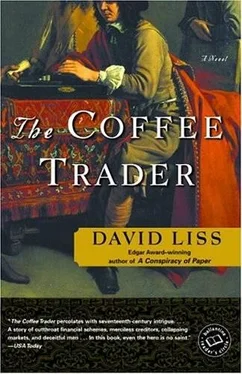“Perhaps I hardly know my business myself,” he told her. “It is only that-well, if I may be so bold-you have not the look, nor the sound either, of a woman I might expect to find selling pies near the Oude Kerk.”
“And you have not the look of the sort of man I might expect to buy one.”
Miguel bowed. “I speak to you in earnest. You’re a beautiful woman who I think is used to better things. How does your husband permit you to ply such a trade?”
Some of the humor drained from Clara’s face. “My husband has fallen on hard times,” she said at last. “We once had a fine place to live and fine clothes, but he lost his money, alas, to the trickery of one of your race. Now he has nothing but debts, senhor.”
Miguel smiled. “You know something of our forms of address. I like that. How long has it been since your husband lost his money?”
“Several months, senhor.” This time the honorific was missing its touch of irony. She began to see something of value in this conversation.
“And you still have debts?”
“Yes, senhor.”
“How much do you owe?”
“Three hundred guilders, senhor. Not so very much money as what we used to have, but now it is enough.”
“I hope you will at least accept my charity.” Miguel took out his nose cloth, heavy with coin. “Here are five guilders.”
She smiled when he pressed the handkerchief into her hands. Without taking her eyes off her benefactor, she slid the little package into her own purse. “I cannot thank you enough.”
“Tell me,” he said brightly, “where I can find this husband of yours.”
“Find him?” Her eyes narrowed and her brow folded upon itself.
“You say he was done wrong by one of my race; perhaps I can do right by him. I might be able to find him some employment or introduce him to someone who could.”
“You’re very kind, but I don’t know that he would want to speak with you, and I know not in what way you might help. He is beyond such simple charity.”
“Beyond? What say you?”
Clara turned away. “He has been taken, senhor, for refusing to work and for lying in a drunken state in the street. He is now at the Rasphuis.”
Miguel felt a vague elation, the thrill of revenge, when he thought of the Rasphuis, that place of cruel discipline from which few emerged and none emerged unbroken. But he was not here for revenge, and Joachim’s suffering brought him nothing of value.
“I must find him there,” Miguel said more loudly than he should have, his hands beginning to twitch with excitement. “I’ll see him at once.”
“See him at once,” Clara repeated back. “What care you if you see him never?”
“That’s no matter,” he answered. Miguel began to hurry off, but Clara grabbed him by the wrist. He could feel her jagged nails scrape along his flesh.
“You’ve not told me the truth, senhor. I think I know you after all. You are the man who ruined my husband.”
Miguel shook his head. “No, not ruined, but shared in his ruin. His affairs and my own suffered together.”
She cast an eye upon his clothes, perhaps a bit soiled but finely wrought. “And what do you want with him now?” Her tone seemed to Miguel not one of protective feeling, or even concern-more of curiosity, and an eager curiosity too. She moved closer to Miguel and let him take in her sweaty and feminine scent.
“I have business of the most urgent sort-it cannot wait until the morrow.”
“I think you will find that the Rasphuis does not offer such liberal hours as our musicos,” she told him, with a little laugh.
“And I think,” Miguel said, with a bravado he did not himself believe, “you will find that any building is open at any time if a man has but the right key.”
Clara turned her head just so and her eyes widened just enough to let Miguel know that she took some pleasure in his firm resolve. She liked a strong man; he could tell that at once. Joachim, if he had ever been such a one, had long since relinquished his strength, allowing his losses to undo his manhood. More the pity for a woman so fine as she.
“I must go,” Miguel said, gently prying loose his hand. “I hope I’ll see you more,” he said, if only for the pleasure of flirtation.
“Who can say what the future holds?” Clara lowered her eyes. Miguel walked away with the confident stride of a man who could have taken a woman but chose not to. Still, if Joachim persisted in incurring Miguel’s ire, if he continued in his absurd program of abuse and revenge, Miguel thought he might have no choice but to seek out Clara again. Were he to plant a cuckoo in Joachim’s unhappy nest, one would then see who had revenge and who looked the fool.
Located in the narrow Heiligeweg, an alley just north of the Singel in the old center of the city, the Rasphuis stood as a monument to the reverence with which the Dutch viewed labor. From the old cobbled streets outside, it appeared no different from any other great house, a heavy wooden door, above which stood a gable stone depicting a blind effigy of justice presiding over two bound prisoners. Miguel studied the image for a moment in the fading light. It would be dark soon, and he had no desire to be caught on the street without a lantern, nor did he wish to be alone in an ancient ghost-ridden street like the Heiligeweg.
Miguel rapped on the door three or four times before a surly-looking fellow with a grease-slicked face opened the upper portion. Streaked with the light of a candle he had set down on a bench behind him, the guard stood offering his studied scowl at Miguel. He was a short man, but broad and thick-necked. The better part of his nose had been cut off in what looked like the not too distant past, and the inflamed skin glistened in the thin light of dusk.
“What do you want?” he asked, with boredom so intense he could hardly bring himself to move his mouth.
“I must have a word with one of the prisoners within these walls.”
The fellow let out a snorting and gurgling sound. The tip of his nose became even more reflective in the candlelight. “They’re not prisoners. They’re penitents. And there are hours to visit the penitents, and there aren’t hours. These aren’t them.”
Miguel had no time for nonsense. What, he asked himself, would Charming Pieter do?
“Those hours ought to be considered flexible,” he suggested, holding up a coin between his thumb and index finger.
“I suppose you’ve a point.” The guard took the coin and opened the door to let Miguel enter.
The front hall indicated nothing of the horrors below. The floor was of a checkered heavy tile, and a series of arches on either side separated the entrance hall from a handsome open-air courtyard. Miguel might have thought this the outer garden to some great man’s home rather than the entrance to a workhouse famed for its torments.
He had heard little of what actually took place inside these walls, but what he had heard bespoke cruelty: vagabonds and beggars, the lazy and the criminal, all thrust together and made to do labors of the cruelest sort. The most incorrigible of these men were given the task of rasping brazilwood, sawing it down to extract the reddish dye. And those who would not do this work, who steadfastly refused to labor, found a worse fate awaited them.
The Rasphuis was said to contain a chamber down below called the Drowning Cell, into which were thrown those who would not work. Water flooded the room, which contained pumps, that the inmates might save their lives through their toil. Those who failed to pump would meet their end. Those who learned the value of hard work would live.
The Dutchman led Miguel, who strained his ears for the sound of sloshing water, down a set of cold and stony stairs and into a chamber, none the most pleasant but hardly a dungeon of terrors. After they left the courtyard, the floor turned from tile to dirt, and the only furniture included a few wooden chairs and an old table missing one of its four legs.
Читать дальше












